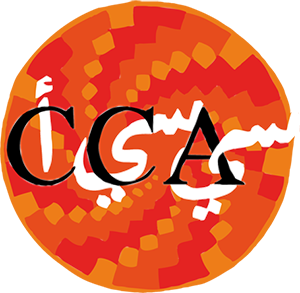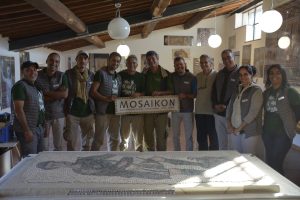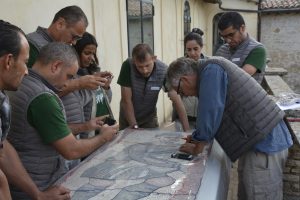MCC 2018 was a new initiative of the MCC program, run by CCA, Centro di Conservazione Archeologica, between September-December 2018 in Italy.
The goal of the new initiative was to share competences and integrate the training between a selection of participants of other Mosaikon courses in order to produce a professional group with balanced and interconnected experiences, in a homogeneous professional profile which will characterize a large group of Mosaikon-certificated conservator/restorers.
MCC2018 was based on two modules. The first module MCC 2018-1 was held in Italy, between September 23rd – October 20th at CCA’s headquarter in Belmonte in Sabina, with field experiences in the Roman villas of Cottanello and Marco Simone, Guidonia.
The program was dedicated to six Algerian former participants of the Mosaikon course “Technicians’ training in restoration and conservation of mosaics in museums” in Arles and Byblos, Lebanon and two Tunisian former participants of MCC J&T 2012-2013.
The second module MCC 2018-2 was held between December 1st –December 20th and was entirely dedicated to Algeria. 8 conservators of the Department of Antiquities -Atelier de Conservation et de Restauration des Mosaïques Antiques à Tipasa- took part to the course designed to deepen topics related to ancient mosaic technology and materials, and practice lime based materials and mosaic application on new Aerolam support.
MOSAIKON is a partnership of four major cultural heritage institutions: the Getty Conservation Institute (GCI), the Getty Foundation, the International Centre for the Study of the Preservation and the Restoration of Cultural Property (ICCROM) and the International Committee for the Conservation of Mosaics (ICCM). The MCC initiative is supported by a grant awarded to CCA by the Getty Foundation.
See more on MOSAIKON initiative:
 on the Getty Foundation website
on the Getty Foundation website
on the GCI website
MCC 2018-1 Algeria&Tunisia: September 23rd to October 20th
MCC 2018-1 was structured in one module of four weeks, and ran between September 23rd to October 20th. It took place at CCA’s headquarters in Belmonte in Sabina, Rieti. It was based on a combination of theoretical lessons and practical work in the laboratory on an original Roman mosaic and field work in Roman archaeological sites near Rieti and Rome. The curriculum was integrated by workshops held by international specialists and group discussions, as well as fieldtrips to archaeological sites.
More than 50% of the training activities were carried out in the laboratory and in the field to allow trainees to acquire the necessary technical skills to carry out conservation interventions in real operational contexts. Hands-on training focused on both lifted and in situ pavements, with specific attention to treatment of mosaics with high difficulties and technical features, such as mosaics re-laid on reinforced concrete. Teaching also covered the maintenance and protection of mosaics, preventive conservation measures and reburial.
This way, the trainees were able to put into practice the theoretical knowledge acquired by dealing with the resolution of conservation problems that normally occur during the exercise of the profession. Special emphasis was given to the knowledge of lime and of the lime-based mortars as traditional materials, learning the techniques for their correct formulation, application and processing.
Five conservators of the Atelier de Conservation et de Restauration des Mosaïques Antiques of Tipasa, Algeria and two former MCC participants of the Institute National du Patrimoine,Tunisia Unité de conservation du Musée de Sousse participated to MCC 2018 first module.
During laboratory activities, they worked on a fragment of an original Roman mosaic dating AD 300-400 coming from Baiae, Naples, depicting a Hunter. They undertook the whole process of removing the reinforced concrete support and reapplying the mosaic on a new support of aluminum honey-comb, using traditional materials.


